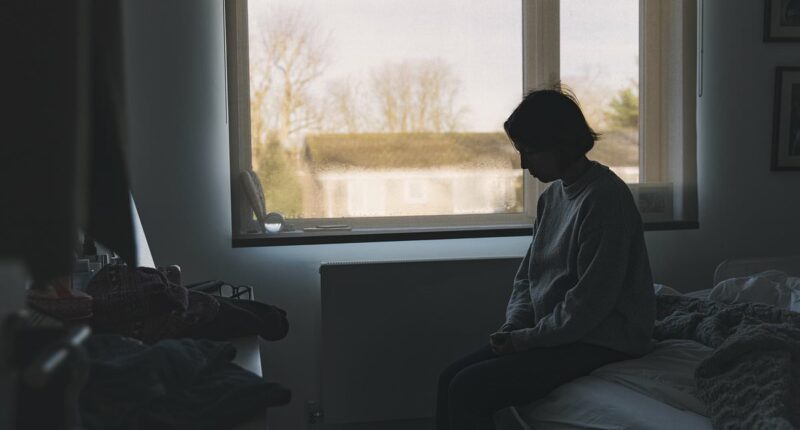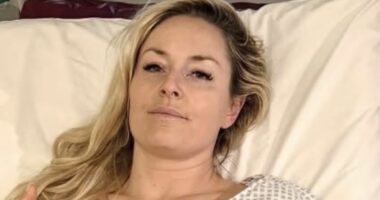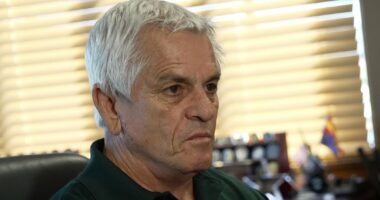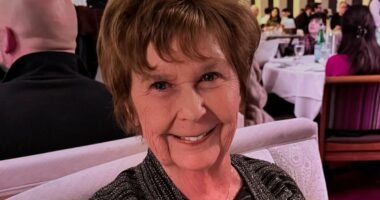Share this @internewscast.com
During what should have been a relaxing holiday with her family, Dr. Anna Brown, whose name has been altered to maintain her privacy, found herself in a sudden and severe medical crisis. At 36 weeks pregnant, she was overtaken by intense abdominal pain while dining with her husband and children.
Despite her obvious distress and need for assistance, her plea for help was met with cold indifference. Her husband, a man who should have been her support, dismissed her suffering and allowed her to return to their room alone, a stark reminder of the ongoing abuse she was enduring.
“I got the children to bed, and I was lying there feeling frightened and unloved,” Anna reflects. Her husband’s icy demeanor pierced through her pain as he entered the room, glanced at her, and callously remarked, “You spoiled my dinner,” a statement that underscored the emotional abuse she was trapped in.
To the outside world, Anna appeared to have it all—a successful career as a pediatrician and a seemingly picture-perfect family. Yet, beneath this facade was a life dominated by coercive control and emotional manipulation. Her husband, David, subjected her to 14 years of psychological torment, leaving her feeling utterly desolate and contemplating the unthinkable.
Adding insult to injury, Anna’s attempt to seek help through psychiatric care became a second ordeal. Rather than finding solace, the experience compounded her trauma, stripping her of what little strength she had left.
Just as bad, her subsequent experience of psychiatric care would traumatise her all over again, she says, and ‘rob me of everything I had left’.
Indeed, shockingly, Anna, who’s now 57, found herself hospitalised and diagnosed with a serious mental illness rather than helped to escape the domestic abuse she was suffering.
Today she is telling her story to help other women whose abuse is misinterpreted by the medical profession as mental illness – a clinical mistake which doctors themselves admit still happens in UK hospitals.

Former doctor, who we are calling Dr Anna to protect her identity, described how her husbands coercive control and emotional torment shattered her sense of self, left her feeling suicidal, and ultimately pushed her into a psychiatric system that, she says, ‘robbed me of everything I had left’ (stock image)
For Anna it has been a long fight for some kind of justice. Earlier this year, some 20 years after she was told she had manic depression and a personality disorder, her GP replaced those labels on her medical record with the phrase ‘victim of domestic abuse’. ‘In hindsight, this patient was a victim of coercive controlling behaviour,’ he wrote on her record in recognition of the true cause of her distress.
It is a victory of sorts, she says, though it does nothing to undo the damage she claims she suffered as a result of the treatment she was given in hospital in the mid-2000s, which included electroconvulsive therapy.
Anna’s breaking point came after years of being ‘treated like a slave’ by her husband. She met him in the mid-1980s while they were both at university. To the outside world, he appeared generous and funny, the kind of man people instantly warmed to. Months of ‘love bombing’ convinced her she wanted to spend the rest of her life with him, and less than 18 months after meeting, they were married.
It didn’t take long for David* to show his true colours, however. Within months of the wedding, Anna, who’s from Worcestershire, found herself increasingly isolated.
‘He’d just be so rude to people, so rude to my friends, that I was embarrassed,’ she says. ‘You start to avoid seeing people, and then you find you’re cut off from them altogether.
‘When I look back now, all our friends were his friends, which makes it harder to leave because you don’t have a support network.
‘When I married him, I felt like I was in a room full of bright, warm, lovely candles. And over the time, he just snuffed out every candle, every light in my life. Until I was done, in darkness.’
In the early years of their marriage, Dr Anna recalls how David would use affection as a form of control.
He wanted to have a sexual relationship, but didn’t offer any other form of intimacy, even refusing to touch her stomach when she was pregnant with their first child.
‘He wouldn’t hold hands. And he wouldn’t dance with me when I was out. He’d dance with other women, but not me.’
If she didn’t feel like having sex, her reluctance was met not with understanding but with anger and sulking so she would often just give in.
‘The emotional side of it wasn’t there at all for him, it was just kind of transactional.’
Financially, he was selfish and controlling too, always finding a way to prioritise his own habits.
‘He drank quite a bit. He expected to have a bottle of wine a night at seven or eight pounds each. And I couldn’t ever get him to tell me what he was spending, or commit to a spending regime.
‘I had to deny myself as a result. I used to find it really embarrassing, because I never really had any nice clothes for work.’
At the time, Dr Anna was a full-time medical student juggling exams and coursework while her husband worked shifts. Because he didn’t drive, she routinely woke at 4:30am to take him to or from work- often waiting outside for hours to bring him home again.
It was another way for him to assert control: she was expected to shape her life around his needs, constantly doing things to keep him satisfied and avoid his anger.
Despite her studies and the demands of renovating their first home, she said she was left to do ‘absolutely everything’, from walking the dog and managing the house, while he refused even to learn to drive or lift a finger to help.
She explained: ‘I couldn’t even ask him to pick his underwear up off the floor. If I did, I was a nag. The pathetic one. He treated me like a slave. I was just expected to do everything.’
Ashamed that her marriage had fallen short of the fairytale she had imagined, she concealed the abuse from her family, who continued to believe David was a devoted and loving husband.
What’s more, he followed the narcissist abuser’s playbook closely, alternating cruelty with affection to create an emotional bond that kept Anna from leaving him, at least at first.
Once she completed her medical training, she began to work exceptionally long hours – sometimes up to 100 a week – looking after sick children in hospital, but was still expected to do all of the house work, cooking and cleaning.
Their three children came along in late nineties, and she dropped down to 56 hours a week to take care of them and run the household.
Now her husband’s callousness ramped up. No matter how hard she tried to make him happy, it was never good enough; he would pick apart everything and belittle her efforts.
On one occasion, he flew into a rage because she had asked friends to help her with house renovation work rather than do it all herself. On another, exhausted after a 36-hour shift, she packed everyone’s cases for a holiday, including David’s – only for him to rip everything out of the case when he got home and tell her: ‘You’ve done nothing then, have you?’
At the time, her parents were sitting downstairs, oblivious to his nastiness.
‘The ridiculous thing is that I was embarrassed. I didn’t want my parents to hear how he was treating me. There was just this constant feeling that nothing I could ever do was right.’
By her mid-thirties, the strain had begun to break her down physically and mentally. Emotionally shattered, she began experiencing blackouts, severe anxiety and depression – her body’s way of warning she couldn’t take any more.
In the early 2000s, with three children under the age of six, she was referred by her GP to a psychiatrist.
While the abuse was never physical, the psychiatrist recognised the signs of coercive control – though this was not then a crime – and urged her to ‘run’ for her own safety.
Anna fled with the children to her parents’ home in Yorkshire, but now her husband launched a campaign to destroy her reputation. Determined to keep control, he began to spread lies about her, convincing others that she was unstable and a danger to her own children. Tragically, even her parents began to believe him. David now took two of their children back, leaving her with their baby.
Faced with this onslaught, Anna spiralled further into depression and started to feel the only way to escape his control was to end her life.
Persuaded by relatives and her psychiatrist to seek help, she admitted herself to a psychiatric ward – yet now it seemed she swapped one form of control for another.
Inside the hospital, Anna claimed doctors failed to recognise it was abuse that had driven her despair. She alleges staff told her they ‘didn’t want to take sides’ in what they perceived as a domestic matter. Instead, she was given strong drugs normally used to treat psychosis and mania, including Lithium, Haloperidol and Valproate, and diagnosed with several serious mental disorders.
‘I’m on that ward and telling them that my husband is the cause of my [mental] injuries. I was made out to be this problem, I was labelled with personality disorder and manic depression. They misdiagnosed my distress.’
Anna stayed in hospital for six weeks, but despite pleading for sanctuary and support, David was now able to manipulate both her family and the psychiatric team into believing she should return to him.
Releasing her to his care, the doctors effectively reunited her with the very man she says put her in hospital in the first place.
‘The people I turned to for help betrayed me. I had no choice but to return to his abuse. If I tried to leave, he told me I would never see my children again. This felt like my death sentence.
‘I was trapped and I was hopeless. If I was beaten up by him and in intensive care my family would have flocked around me, but I was beaten up psychologically instead and no one could see that.
‘I’m not cross with my family though – they trusted the psychiatrists to get it right.’
Less than two months later, her mental health now in steep decline, Anna was back in hospital. Once again she was heavily sedated with powerful antipsychotics, and soon after underwent 21 sessions of Electroconvulsive Therapy [ECT], where electric currents are passed through a patient’s brain to cause seizures or fits. ‘Unlike some women I ‘consented’ to have ECT. But I consented because I was told it would cure my depression. I was told it was what I needed. By that time I was so heavily drugged up, I couldn’t think straight. And you trust your doctor.’
Anna claims the ECT resulted in devastating memory loss and caused her to lose all recall of her medical training. She has never returned to her work as a paediatrician.
‘Afterwards I couldn’t recognise faces of friends or family. I went from being a doctor to being unable to do primary school maths.
‘I couldn’t navigate to the shops or walk around familiar places. I lost my independence.’
Even now, 20 years on, the effects of the ECT linger. ‘I can go from intelligent and able to my brain becoming so tired it’s hard to speak or do simple tasks like running a bath or getting dressed.
‘I have to sleep every afternoon. I will live with the injury [done to my brain by ECT] until the day I die. Neither my abusive husband nor the psychiatrists have ever been held accountable.’
At the time of her admission to hospital, coercive control was not legally recognised as a form of domestic abuse. As a result, she believes, many victims were pathologised rather than protected. In 2015 coercive control became a crime, yet she thinks women are still being wrongly labelled with mental health disorders instead of being identified as survivors of prolonged and systematic abuse.
For Anna, escape finally came in 2007, when she once more fled to her parents’ house with her children – and this time convinced them she was being abused and refused to go back. Today she lives with her new husband, a kind and understanding man, in her hometown. She does three hours of volunteering a week, but is unable to work.
In an effort to protect other abuse victims from a similar fate on psychiatric wards, she raised a complaint in 2010, informing management at the hospital of their failure to recognise and respond appropriately to her experience of domestic abuse.
She claimed the complaint was ‘rebuffed’, so she submitted another in 2016, which she says was also dismissed.
Dr Anna is now urging Jess Phillips MP and Safeguarding Minister and Health Secretary Wes Streeting to implement an immediate ban on the use of ECT as a treatment for survivors of domestic abuse.
Dr Lucy Johnstone, a Consultant Clinical Psychologist, is concerned that administering ECT to women with a history of domestic abuse can unintentionally replicate the dynamics of that abuse.
Speaking to The Daily Mail, she said: ‘Two things are going on which are very destructive. One, if you tell someone who is a victim of domestic abuse that she has a mental illness, I would see that as more gaslighting.
‘It’s not much different from the perpetrator saying ‘you’re too sensitive, I didn’t really do that, that didn’t really happen’.
‘The effect is it will conceal the real reason for her distress. The distress of women in abusive relationships is understandable in context.
‘And the second thing is, if ECT is given in those circumstances, and I have seen this, how different is that from a perpetrator hitting you around the head?
‘I believe ECT is done in good faith by staff who want to help people get better but what they may not be able to see is how they are replicating damage.

Then in 2005, Dr Anna underwent 21 sessions of Electroconvulsive Therapy, resulting in devastating memory loss (stock image)
‘There has been quite a lot of research where women say ”I felt like I was traumatised again, I felt like I had been raped again, I felt like I was being held down and attacked again.”’
In an online statement Dr Philippa Greenfield, Joint Presidential Lead for Women and Mental Health at the Royal College of Psychiatrists, said: ‘Clinicians often do not realise that violence, abuse and coercive behaviour can have serious mental health implications. This lack of awareness can leave victims undetected and their mental health needs not appropriately addressed.
‘As soon as the need arises, victims of domestic abuse should be offered the right support.’
Meanwhile Dr Catherine Durkin, Joint Presidential Lead for Women and Mental Health at the Royal College of Psychiatrists, says we ‘have long been aware of the serious harm violence and abuse can do to women and girl’s mental health’. ‘Tragically, it is not uncommon for female patients to experience long-term abuse that causes serious symptoms, including suicidal ideation or symptoms of psychosis.’
Dr Anna agrees. ‘My distress was a perfectly normal reaction to the daily horrors that I was facing,’ she says. ‘All I needed was for my abuse to stop. I needed talking therapy. I needed protection.
‘Instead my distress was medicalised and psychiatrists told me I was ill, that I had a chemical imbalance in my brain that only they could cure by drugs and ECT.
‘If women refuse treatment, psychiatrists section us. Women are then dragged to ECT trolleys and restrained where the ECT is given against their will. This is state sanctioned abuse, she claims.
‘No amount of ‘happy pills’ or ECT was going to be ‘mind altering’ enough to make the abuse I was suffering feel like I was having a fun and happy marriage.
‘Why do psychiatrists and society think this is how to cure abuse? It is the same treatment that abuse victims have been subjected to for centuries.’
John Devapriam, Chief Medical Officer for Herefordshire and Worcestershire Health and Care NHS Trust told the Daily Mail: ‘Electroconvulsive Therapy (ECT) is a clinically recognised, safe, and effective treatment for severe mental health conditions such as depression, catatonia, and acute mania, particularly when other treatments have failed.
‘It is administered under strict medical supervision in line with NICE guidelines and can be life-saving.
‘We support informed decision-making through patient resources and ensure consent is obtained, including for those lacking capacity. Care is tailored to individual needs, and staff work with a trauma-informed approach and access specialist safeguarding advice to ensure safety and compassion.’

















